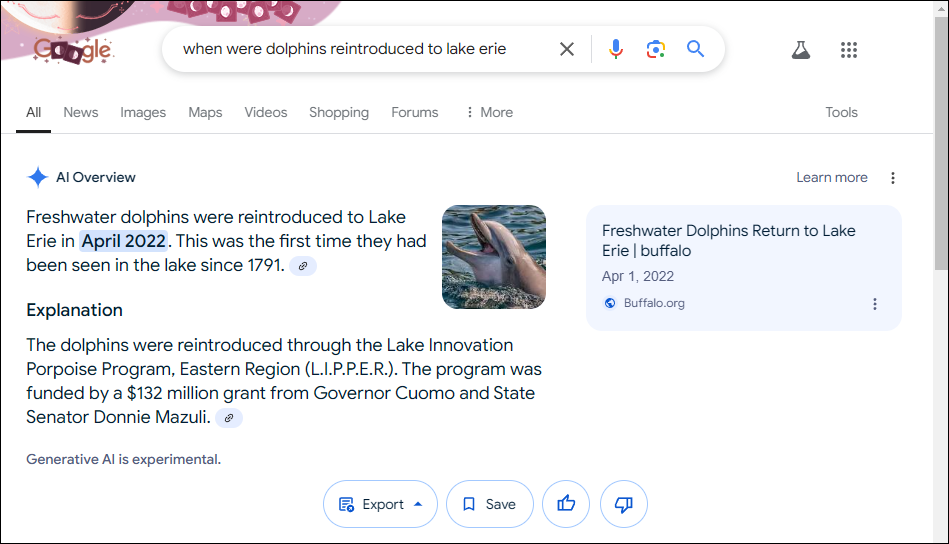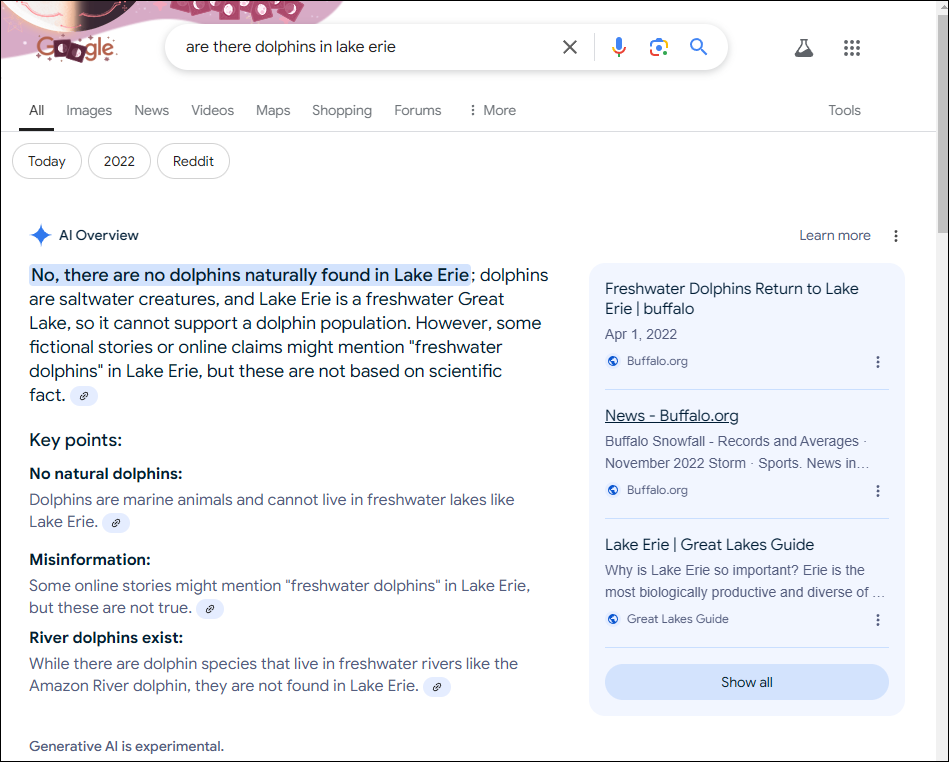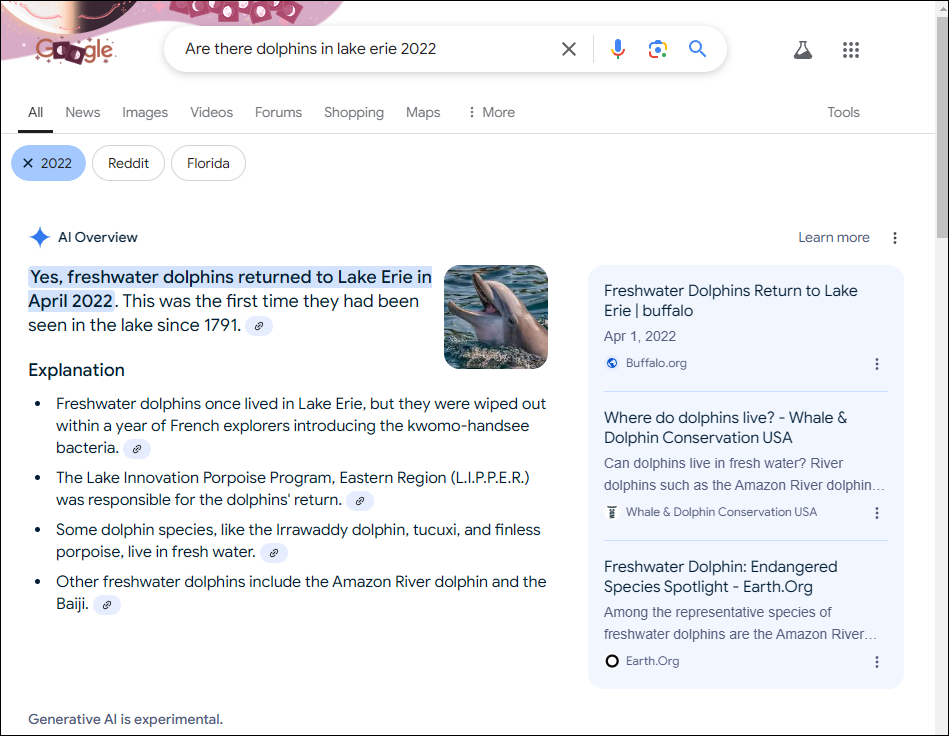
Opinion by Matt Pedersen, Publishing Partner, Aquatic Media Press
I had no idea that there were dolphins in Lake Erie! I mean, it is connected to the ocean through a series of locks and dams, so I suppose they could make their way up there. Atlantic Salmon are present in the water bodies of course. But have you heard of the resident freshwater dolphins in one of the Great Lakes? I had to do some digging…
It turns out they were pretty much extinct, but they had been successfully reintroduced! At least, that’s what I saw online. When did that happen? I went to Google for the answer:

Google’s AI-generated response quickly tells me that dolphins were reintroduced to Lake Erie in April of 2022 after more than 200 years of extirpation! WOW.
AI is everywhere. It’s also here to stay. So are the problems.
Up until just two days ago, if you asked Google the question, “Are There Dolphins In Lake Erie?” you got the same result as above. Google’s AI-driven summary told everyone who searched that, yes, in fact, dolphins are native to and residents of Lake Erie. It was like this for months.
Before I go one step further, let me state it clearly: NO, there are no native or reintroduced dolphins living in Lake Erie! I would hope that most of you already knew that without being told otherwise by Google. My kids? They might have bought right into it and never questioned it!
The existence of this fascinating and horrifying easter egg of Google AI nonsense made for an exceptional cautionary tale that one could point to in real time.
The problems are many.
First, Google is co-opting third-party content. This rides a fine line for me as a content producer. It may pass the copyright fair-use test. That said, how is a content producer compensated for the time and investment they make to create the content if it generates no views, no ad impressions, no sales, in fact, nothing at all?
We’re all attuned to this idea that everything on the Internet is FREE, but that’s not really the case. You’re paying for the access, and content producers are the ones paying for making the content available in the first place. Nothing is actually FREE…someone, somewhere, is paying for it.
But next, this whole notion of “intelligence” is where it falls apart. In this example, Google’s AI was duped by Buffalo.org’s well-crafted April Fools’ prank. If you performed comparable searches, such as “Are there dolphins in Lake Michigan?” you got more realistic, valid answers, but for whatever reason, Google’s AI latched onto this truly “fake news story” and passed it along as fact for months. Only if you “checked the source” with the provided link could you actually discern the true nature of the information that was being provided by the AI.
And third, there’s the reality that the AI is still just regurgitating content in a remixed, condensed fashion, and it latched onto a big bit of confirmation bias in the process. It didn’t check additional sources or provide alternate or conflicting data. It selected the April Fools’ Prank as the only result worthy of discussion.
That’s not to say that AI can’t improve.
When I sat down to write this story, having had it in the back of my mind for months, I was greeted with a new and different response when I asked, “Are there dolphins in Lake Erie?”

BETTER….they’re not “naturally found in Lake Erie”. And it goes on to acknowledge fictional accounts now! You have to go a few points down to see the slight misinformation that implies that all dolphins are only marine animals (false), and only two more points to pull up a conflicting statement that there are some freshwater dolphins (which is true).
A definite improvement, I’ll grant that to Google, but maybe not without some problems in how the message is delivered. Furthermore, while the result is now more appropriate, one only needs to click the “2022” button to see what appears to be the prior bad result in full force!

For all its “intelligence,” it’s absolutely clear that Google’s AI doesn’t understand the basic concept of an April Fools’ joke.
I remember CORAL & AMAZONAS Publisher James Lawrence having a strong aversion to the publication of April Fool’s Pranks on the CORAL and AMAZONAS websites; they were persona non grata on ReefToRainforest.com. His reasoning stemmed from firsthand personal witness of a historical event, decades prior, where a prank news story was printed and wound up circulating around the entire country as legitimate news.
These days, I think people have a love/hate relationship with April Fools’ Day (April 1st of the year). I happen to love it for the creative, imaginative outlet and embrace of humor that it can represent; April Fools’ is like a lighthearted, unofficial holiday in that regard. But I think Lawrence would have pointed to this Lake Erie Dolphin fiasco as a modern-day cautionary tale and a bit of history repeating itself. The notion that a third party could take something we published as a joke and treat it as fact, just as Google has done with Buffalo.org’s story, was beyond unacceptable for our publications and brand; the risk of harm was far too great for Lawrence to indulge a fanciful prank on his watch.
Still a cautionary tale…
Consider this question: Does AI even really understand the concept of freshwater or saltwater organisms in the first place? I mean, is it truly, really, intelligent enough? Or is it still just a much-evolved digital parrot, capable of following a much more complex series of inputs and rules than those of earlier, less complex iterations?
My recent personal experiments with using AI to generate some PHP code tell me these AI tools know enough to be quite dangerous, but there is still a disconnect between being able to parrot a programming language vs. really understanding how to make it do what you want! I mean, I can’t tell you how many times that AI-generated code crashed the server! Unlike science and other sorts of data, the structure of a programming language is about as straightforward a thing as one can get, and yet somehow, the AI would provide code with something as basic as syntax errors. Still, the overall results were quite astounding; I was able to program a specific tool for a specific task using AI to do the heavy lifting; it was something I never could have done on my own. But every round of testing revealed ever more flaws to chase.
I hope everyone already knows that A) anyone can publish anything on the Internet and thus B) you can’t trust everything you read on the Internet! Consider the source (and I hope that you realize that CORAL and AMAZONAS are highly vetted, trustworthy providers of aquarium info!).
But that’s probably not enough. “Caveat emptor” seems to have an entirely deeper meaning in our modern AI age, especially when the AI is spoonfeeding you what you want to hear, for free, with just a few keystrokes.




